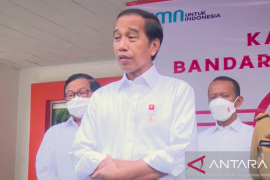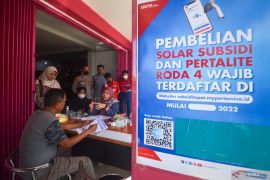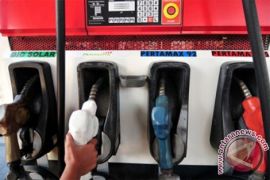"The impact on inflation of such a fuel oil price hike will not be much different, namely about 0.6-0.8 percent. But the subsidized fuel oil consumption limitation plan will contribute about 1.0 percent to inflation." Fabby said.Jakarta (ANTARA News) - The government`s plan to limit the sale of subsidized fuels beginning April 1 in Java and Bali is not the best solution to the subsidy problem, an observer said.
"The main problem is the amount of the subsidy itself, not the consumption of subsidized fuels, and the world fuel price has been soaring until today," said Fabby Tumiwa, executive director of the Institute for Essential Services Reform (IESR), here Friday.
He said it was actually better for the government to raise the price of subsidized fuels by Rp500-Rp1000 as the impact of such a price hike on inflation would not differ much from that of limiting subsidized fuel oil consumption.
"The impact on inflation of such a fuel oil price hike will not be much different, namely about 0.6-0.8 percent. But the subsidized fuel oil consumption limitation plan will contribute about 1.0 percent to inflation." Fabby said.
For the long term, he said, the optimal policy would be raising the premium gasoline price because restricting the use of subsidized fuel oil by private cars would not solve the government`s subsidy problem.
"The price adjustment is like a time bomb for policymakers and the public in the future," Fabby said, adding that during President Susilo Bambang Yudhoyono`s terms in office, the prices of subsidized fuels had already been raised by 100 percent.
"It will be much better if the government raises the subsidized fuel oil price, make it not much different from that of non-subsidized fuel oil," he added.
According to Fabby, the government should consider raising the price of subsidized fuel oils because the problem was a long term one that would be passed on to the next national leader and the public considering that world oil prices were unstable.
"The limitation is permissible, but aside from this issue, the supervisory problem must be considered carefully ," Fabby added. The existence of the limitation would create a black market where the price of subsidized fuel oil would be above the normal price but below that of non-subsidized fuel oil.
"A black market will bring the people and, of course, also the government, to grief because its profits would not be for the country," he said.
On Thursday (Jan 5), Finance Minister Agus Martowardojo said the government`s plan to limit subsidized premium gasoline consumption in Java and Bali would be implemented starting on April 1, 2012. As of this date, premium would only be sold to public transport vehicles and motorcycles.(*)
Editor: Heru Purwanto
Copyright © ANTARA 2012











